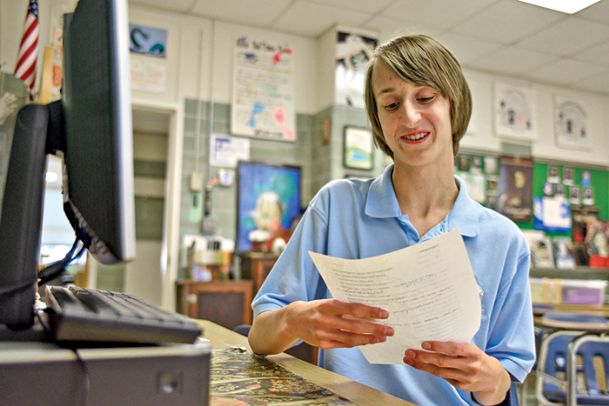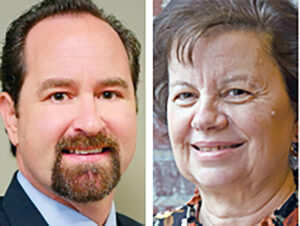Reagan Poston said reading her prose pieces aloud for Mississippi Public Broadcasting was like being published in a “verbal publication.”
The freshman New York University student from Mantee — “Population 204,” she said — attended the Mississippi School for Mathematics and Science her last two years of high school where she and 21 other students from English teacher Emma Richardson’s creative writing classes read their own works aloud for MPB.
It’s part of the Rural Voices Radio Project, MPB’s partnership project with the Mississippi Writing/Thinking Institute at Mississippi State University. Students and teachers from around the state read their own 90-second prose or poetry, which airs daily at 3:28 p.m.
“That’s gratifying, to know that students are writing for an authentic audience,” Richardson said. “… This is a good vehicle for students to get their writing out there.”
That was certainly the benefit for Poston, who wants to be a professional writer — hopefully a novelist, she said, though she has also written short stories and poetry.
For the radio, she read aloud two short prose pieces called “Mathiston,” which aired on Aug. 31 and “Fruit of the Earth,” which hasn’t aired yet.
With both pieces, Poston wanted to capture small-town, southern living. She thinks that’s especially important now that she’s living in New York where she says people attach a stigma to Mississippi.
“I really think the South is a very complicated place, and I wanted to show that complexity in my writing,” she said.
For MSMS senior Aidan Dunkelberg, who grew up in Columbus, dispelling some negative southern stereotypes is also the reason he wrote “Di’lects,” which he recorded for the project last year but which hasn’t aired yet. In the poem, he said, he wanted to capture southern speech patterns. He thinks there’s a negative connotation associated with southern and rural accents.
“And I very much can see that,” he said. “But at the same time, this poem was kind of a way to put (accents) in a positive connotation.”
He’s particularly proud of the line “It’s a language I grew up with/simmered in like butter beans in boiling water.”
“That’s what comes to mind when I think of this poem,” he said. “It’s not a typical southern thing but (also) not one that’s been stereotyped as much, like fried chicken.”
Unlike Poston, he has no plans to be a professional writer, but he said he’ll be writing poetry as a hobby for as long as he lives.
Breaking out of their own skin
Richardson said just having so many students read for the project is great for MSMS, even if those students don’t choose to write professionally.
“Even though we are a math and science school … our students are talented in so many areas,” she said. “They love reading and language and languages. They like to write.”
In her classes, Richardson gets her students used to reading aloud.
“I think it prompts the student to listen to the cadence of their words,” she said. “There’s a musicality to the English language.”
But it also helps students understand themselves and each other better. She referenced the playwright Tennessee Williams, who said every person is sentenced to “solitary confinement inside our own skins.”
“When students hear other students read, they’re able to break out of their own skin,” she said.
That’s the power of imaginative literature like poetry and short prose, she said.
“There’s a benefit to seeing things from someone else’s perspective,” she added.
As for the Rural Voices project, Poston said it is a way for Mississippians to get that alternate perspective from teenagers like her and Dunkelberg.
“I think it’s important for teenagers to have a voice in the community,” she said. “… I think sometimes people don’t really hear us and this is a good way for them to hear us.”
You can help your community
Quality, in-depth journalism is essential to a healthy community. The Dispatch brings you the most complete reporting and insightful commentary in the Golden Triangle, but we need your help to continue our efforts. In the past week, our reporters have posted 49 articles to cdispatch.com. Please consider subscribing to our website for only $2.30 per week to help support local journalism and our community.








